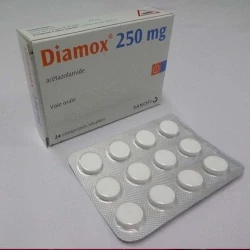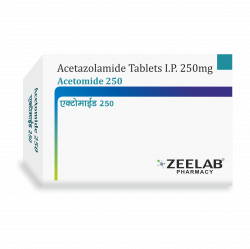Download India's most affordable pharmacy app
- Compare with medicine prices
- Save upto 90% on your medicine bills
COMPOSITION:
Acetazolamide (250mg)DESCRIPTION:
Diamox Tablet contains Acetazolamide (250 mg). It is a carbonic anhydrase inhibitor used to treat conditions like glaucoma, certain seizures, altitude sickness, and fluid retention (edema). It reduces fluid production in the eye and helps remove extra fluid from the body. Take this medicine only under a doctor’s guidance and follow regular check-ups as advised.
Uses of Diamox Tablet
Glaucoma treatment: Lowers intraocular pressure by reducing fluid production in the eye.
Altitude sickness prevention: Helps reduce symptoms such as headache, nausea, and dizziness at high altitudes.
Seizure control: Used as an add-on in certain types of epilepsy to help reduce abnormal brain activity.
Edema management: Helps remove excess fluid in conditions like heart failure or drug-induced swelling.
Benefits of Diamox Tablet
Effectively lowers high eye pressure to protect vision in glaucoma.
Reduces risk of altitude sickness symptoms for travelers and climbers.
Supports seizure control when used with other anti-epileptic medicines.
Helps reduce swelling and fluid retention in specific medical conditions.
How Diamox Tablet Works
Acetazolamide 250 mg inhibits the enzyme carbonic anhydrase. This reduces production of certain body fluids and increases urine output. In the eye, this lowers fluid formation and decreases intraocular pressure. In the body, increased urine helps remove excess fluid and salts. It can also help stabilize brain activity in some seizure types.
How to Take Diamox Tablet
Take exactly as prescribed by your doctor. Do not change the dose without advice.
It may be taken with or without food; follow your doctor’s directions.
Swallow the tablet whole with water; do not crush or chew unless told to.
Avoid missing doses; if you miss one, take it as soon as you remember unless it’s near the next dose.
Maintain adequate fluid intake unless your doctor advises otherwise.
Side Effects of Diamox Tablet
Common: Tingling or numbness in fingers/toes, frequent urination, tiredness, dizziness, or changes in taste.
Serious (seek medical help): Severe skin rash, difficulty breathing, irregular heartbeat, confusion, muscle weakness (may signal electrolyte imbalance), or signs of severe dehydration.
Safety Advice
Allergy/Contraindications: Do not use if allergic to Acetazolamide or any ingredient. Inform your doctor about past reactions.
Alcohol: Limit alcohol; it may worsen dizziness or drowsiness.
Pregnancy: Use only if clearly needed and prescribed by your doctor. Discuss risks vs benefits.
Breastfeeding: Consult your doctor; use only if recommended after careful assessment.
Driving: Avoid driving or operating machines if you feel dizzy, tired, or have blurred vision.
Kidney/Liver: Use with caution in kidney or liver disease. Dose changes and monitoring may be needed.
Electrolytes: This medicine can affect salt levels (electrolytes). Report muscle cramps, weakness, or severe tiredness to your doctor.
Drug interactions: It can interact with other medicines (e.g., aspirin, some seizure drugs). Always tell your doctor or pharmacist about all medicines and supplements you take.
Frequently Asked Questions (FAQs)
Q. Can I take Diamox Tablet on an empty stomach?
A. Yes, it can be taken with or without food. If stomach upset occurs, take with a meal.
Q. Is long-term use safe?
A. Long-term use may be needed for conditions like glaucoma but requires regular monitoring for side effects and electrolyte balance.
Q. Can I stop when I feel better?
A. No. Do not stop without your doctor’s advice. Stopping may cause symptoms to return or worsen.
Q. Does it cause weight gain?
A. No. It may cause mild weight loss due to increased urination, not weight gain.
Q. What if I miss a dose?
A. Take it as soon as you remember. If it is nearly time for the next dose, skip the missed dose. Do not double the dose.
Q. How does it help with altitude sickness?
A. It helps the body adjust by changing blood chemistry and increasing breathing, which may reduce altitude sickness symptoms.
Q. Can I take it with other medicines?
A. It may interact with many drugs. Consult your doctor before combining medicines, including over-the-counter drugs and herbs.
Q. Are there any special tests needed?
A. Your doctor may check kidney function and electrolytes during treatment, especially on long-term use.
Q. Is it suitable for elderly patients?
A. Yes, but elderly patients may need closer monitoring for dehydration and electrolyte changes.
Q. Can pregnant or breastfeeding women use it?
A. Use only if prescribed after careful discussion of risks and benefits with your doctor.
Disclaimer: This information is educational and does not replace medical advice. Follow your doctor’s instructions for dosage, monitoring, and safety checks.









 Added!
Added!